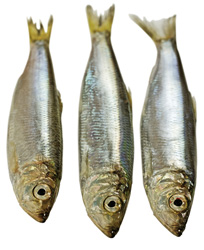A sustainable future for Europe's forage fish
The EU-funded 'Forage fish interactions' (FACTS) project focussed on four main foraging fish: herring, capelin, sardine and anchovy in the Baltic, Barents, Bay of Biscay and the North Seas. FACTS has also developed and disseminated advice on the effects of various forage fish harvesting strategies to the ecosystem, including their economic implications. Project researchers quantified the trophic interactions between forage fish and their prey and further investigated the competition among forage fish species. Changes in potential habitat characteristics and prey requirements were quantified using physiological-based habitat modelling to determine likely areas of distribution. The project used multispecies models to investigate the effect of forage fish exploitation on diet and food intake. Bioenergetic models helped assess their effect on reproductive potential of top predators. This has enabled identification of the ecological requirements and economic costs for forage fisheries when top predators sustain or reach a specific reproductive potential. By analysing several ecosystems as well as generic models, FACTS provided the basis for deriving general rules applicable to forage fish fisheries in European waters. This type of general knowledge required internationally coordinated investigations of forage fish dynamics in a range of different ecosystems rather than local studies. FACTS dissemination efforts to all Member States will continue after the project term. Media include the project website(opens in new window) and popular scientific press and peer-reviewed journals, daily/weekly press and workshops as well as brochures and newsletters. Consortium members recommend a pan-European approach to ecosystem management and have built a network of associated partner institutes to aid its evolution. Similar initiatives are being undertaken in the north-west Atlantic and, to promote optimal flow of knowledge and initiative sharing, a Canadian institute has become an associated partner. The project has assessed the importance of forage fish in European ecosystems and its economy. This analysis can be used to weigh the costs and benefits of different levels of exploitation of forage fish resources. It therefore provides a basis for decision makers to integrate forage fish dynamics and their exploitation into an ecosystem within the European Common Fisheries Policy (CFP).







